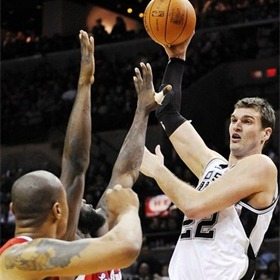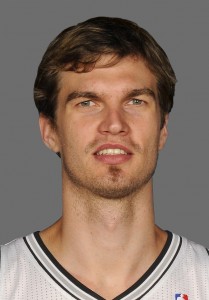 It’s a game of milliseconds, yes. Tony Parker’s clinching bucket with .0000001 seconds left on the shot clock in Game 1 of the NBA Finals proved that.
It’s a game of milliseconds, yes. Tony Parker’s clinching bucket with .0000001 seconds left on the shot clock in Game 1 of the NBA Finals proved that.
But this game also comes down to sheer inches. And here, The San Antonio Spurs — like the Indiana Pacers before them — have a decided advantage.
Granted, no way the San Antonio Spurs beat Miami 92-88 without the brilliance of 6-1 Tony Parker, or future star 6-8 Kahwi Leonard, who did just about as good a job guarding LeBron one-on-one as is humanly possible on Thursday night.
Yet just as important to the Spurs’ ultimate hopes of toppling the defending champion Heat is their big man duo of 7-0 Tim Duncan and 6-11 Tiago Splitter.
Duncan, of course, is the headliner here. The 37-year-old contributed 20 points, 14 rebounds, four assists and three blocks in the opener after an 0-for-5 first quarter. As ever, the Big Fundamental put brush to canvas in crunch time. You saw it with 5:30 left in the game, Spurs up 83-79, when Duncan slithered into the lane to tip in a Leonard miss over LeBron James.
You saw it in the way Duncan masterfully played defensive angles to keep Dwyane Wade from getting off contortionist shot attempts with his usual degree of comfort. At least three times in the final quarter, Duncan’s long arms prevented Wade from scoring (or getting fouled), including on a layup attempt in the final seconds.
Splitter wasn’t even on the floor in the final minutes. But in the 25 minutes he played, he did damage by simply playing solid positional defense on Chris Bosh and willingly throwing his body into the fray and absorbing blows from LeBron James, Chris Anderson and Udonis Haslem.
Splitter is a tad slow-footed, yes, but makes up for it with smarts and simply being taller than his opponents in this round.
 The 28-year-old Splitter won’t impress in the box score – he only put up seven points, two rebounds and one block on Thursday – but his length and underrated strength are major reasons why the Spurs ranked 3rd in opposing field-goal percentage at the rim this season.
The 28-year-old Splitter won’t impress in the box score – he only put up seven points, two rebounds and one block on Thursday – but his length and underrated strength are major reasons why the Spurs ranked 3rd in opposing field-goal percentage at the rim this season.
Throughout the last three postseasons, Splitter has evolved into most imposing complement to Duncan since David Robinson. The world-class skill, so evident when he starred in Spain half a decade ago, has always been there. It’s his focus and confidence that have exponentially improved. Want proof? He shot 37 percent in last year’s playoffs; this postseason, he’s shooting 76 percent.
Indeed, Splitter is the “better Oberto” whom Spurs fans have wanted for years, writes J. Gomez for the blog Pounding the Rock: “The team being in the Finals for the first time since 2007, the year Tiago was drafted, is just the last piece of evidence that confirms it.”
As the defensive backbone of these Spurs, Duncan and Splitter are the latest in a long line of “twin towers” who have left their mark on pro basketball history by helping lift their team to playoff success. Yes, the popularity of small ball still appears to be on the rise, especially as advanced analytics continue to place a premium on 3-point shooting. And, in Game 2, you’ll likely see the Heat try to ramp up the pace from Game 1 by throwing all kinds of small-ball shenanigans at the Spurs to make Splitter – and, to a lesser extent, Matt Bonner – less of a factor.
If this happens, expect Gregg Popovich to counter, at some point in the game, with a punishing Duncan-Splitter tag team that Miami won’t be able to physically match. It should make for riveting basketball.
So, how do Duncan/Splitter compare to the greatest big man tandems in pro basketball postseason history?
I’ll save you the suspense: From a statistical standpoint, they don’t rank highly. They probably will never rank highly – even if Splitter were to jump into his magical trans-corporeality chamber and morph into the second coming of Ralph Sampson:
Gettin ready for playoff!! Doing some cold treatment! Check it out -142 Celsius #Cryosauna twitter.com/tiagosplitter/…
— Tiago Splitter (@tiagosplitter) April 17, 2013
After the jump is a list of other twin towers who played pivotal roles – primarily in the pivot – leading their teams to at least the semifinals. Each duo includes at least one seven-footer.